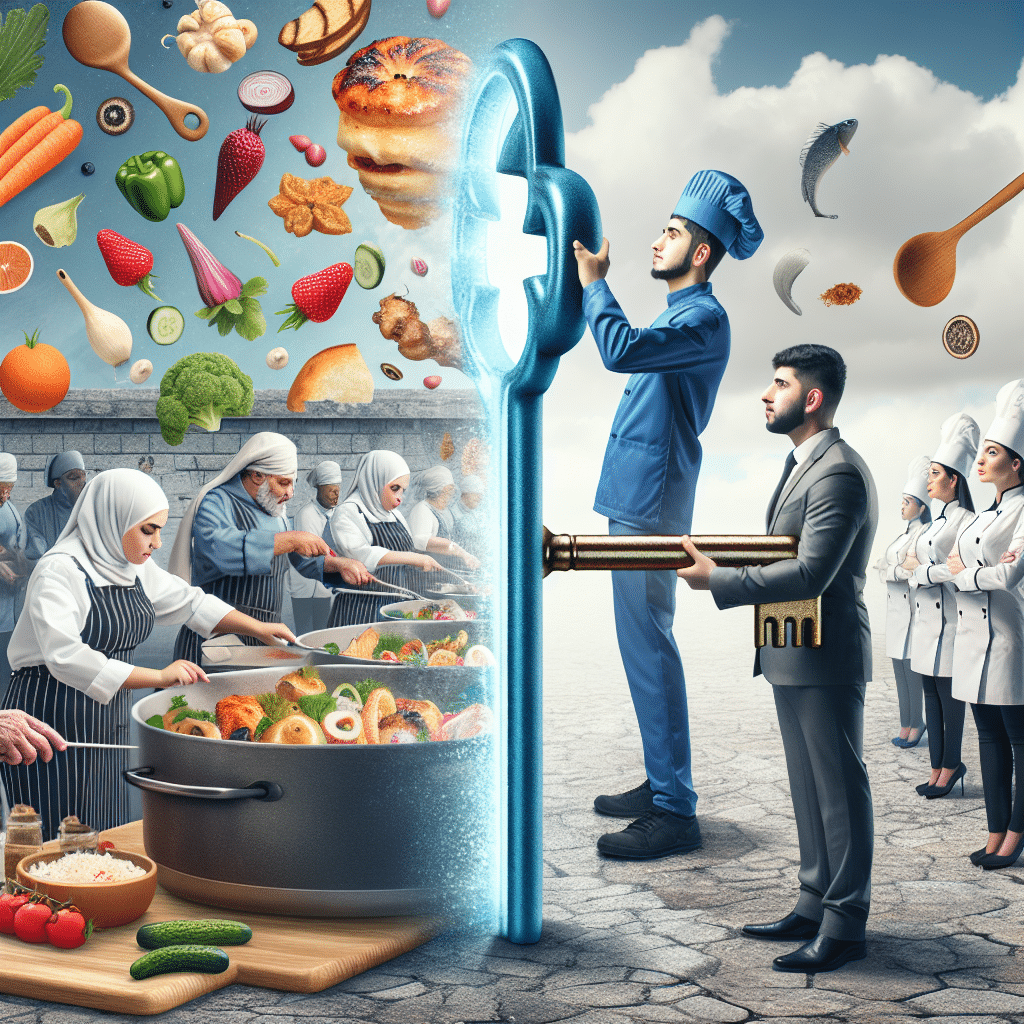Upskilling, the Key to Addressing the Emerging Challenges and Dynamic Narratives in Food Services
-
Table of Contents
- Upskilling in Food Services: Navigating the Industry’s Dynamic Future
- The Current Landscape of Food Services
- Upskilling: A Strategic Imperative for Food Services
- Statistics Supporting the Need for Upskilling
- Best Practices for Implementing Upskilling Programs
- Case Studies: Success Stories in Upskilling
- Conclusion: The Future of Food Services Through Upskilling
- ETprotein: Enhancing Food Services with Quality Protein Products
Upskilling in Food Services: Navigating the Industry’s Dynamic Future

The food service industry is a dynamic and ever-evolving sector, facing a myriad of challenges ranging from technological advancements to changing consumer preferences. As the industry navigates through these changes, upskilling has emerged as a critical strategy for businesses to remain competitive and relevant. This article delves into the importance of upskilling in the food services sector, exploring how it can address emerging challenges and shape the future narrative of the industry.
The Current Landscape of Food Services
The food service industry is characterized by its fast-paced nature and the constant need to adapt to new trends. With the rise of health-conscious consumers, the demand for organic, plant-based, and sustainable food options has surged. Additionally, technology has revolutionized the way food is ordered, prepared, and delivered, with online platforms and automation becoming increasingly prevalent.
Despite these advancements, the industry faces significant challenges, including labor shortages, high turnover rates, and the need for continuous innovation. To overcome these obstacles, upskilling the workforce has become more than a necessity—it’s a strategic imperative.
Upskilling: A Strategic Imperative for Food Services
Upskilling refers to the process of teaching employees new and advanced skills that are required to thrive in their current roles or to take on new responsibilities. In the context of food services, upskilling can encompass a range of competencies, from culinary expertise to digital literacy.
- Culinary Expertise: Chefs and kitchen staff need to be trained in new cooking techniques, dietary requirements, and food safety standards to meet the evolving demands of consumers.
- Customer Service: Front-of-house staff must refine their communication and interpersonal skills to enhance customer experience and loyalty.
- Technology Proficiency: All employees should be comfortable using new technologies, such as point-of-sale systems, online ordering platforms, and inventory management software.
- Business Acumen: Managers and supervisors require up-to-date knowledge in areas like cost control, marketing, and sustainability practices to run operations efficiently.
By investing in upskilling, businesses can not only address current industry challenges but also prepare for future shifts in the market.
Statistics Supporting the Need for Upskilling
Recent studies highlight the urgency of upskilling in the food service sector. According to a report by the National Restaurant Association, 80% of restaurant owners said that technology in their operations would become more important in the future. Furthermore, a survey by Deloitte revealed that 77% of companies recognize the importance of upskilling their workforce, yet only 10% feel ready to address this need.
These statistics underscore the gap between the recognition of upskilling’s importance and the implementation of effective training programs. Closing this gap is essential for the food service industry to progress.
Best Practices for Implementing Upskilling Programs
To effectively upskill employees, food service businesses should consider the following best practices:
- Identify Skill Gaps: Conduct a thorough assessment of the current skill levels of employees and identify areas that require improvement.
- Customize Training: Develop tailored training programs that address the specific needs of different roles within the organization.
- Leverage Technology: Utilize online learning platforms and mobile apps to make training accessible and flexible for employees.
- Encourage Continuous Learning: Create a culture of lifelong learning by providing ongoing opportunities for professional development.
- Measure Outcomes: Track the effectiveness of upskilling initiatives by setting clear metrics and evaluating performance improvements.
By following these practices, food service businesses can create a robust upskilling strategy that drives growth and innovation.
Case Studies: Success Stories in Upskilling
Several leading food service companies have successfully implemented upskilling programs. For instance, Starbucks has invested in its “College Achievement Plan,” which provides employees with tuition coverage to pursue higher education. McDonald’s “Archways to Opportunity” program offers career advising and education assistance to its workforce. These initiatives not only improve employee skills but also enhance retention and attract new talent.
Conclusion: The Future of Food Services Through Upskilling
Upskilling is not just a trend but a strategic necessity for the food service industry. By embracing continuous learning and development, businesses can address the challenges of a dynamic market and shape a future that is innovative, efficient, and customer-centric. The key takeaways for food service businesses are clear: invest in your workforce, embrace technology, and foster a culture of lifelong learning to stay ahead in the competitive landscape.
ETprotein: Enhancing Food Services with Quality Protein Products
In line with the narrative of upskilling and innovation in food services, ETprotein offers a range of high-quality protein products that cater to the evolving needs of the industry. Their organic and non-GMO protein options, such as rice protein, pea protein, and various seed proteins, are ideal for businesses looking to expand their offerings with health-conscious and sustainable choices.
ETprotein’s commitment to excellence and their extensive product range can help food service businesses enhance their menus and meet the dietary preferences of modern consumers. By incorporating ETprotein’s products, businesses can demonstrate their dedication to quality and innovation, key factors in the industry’s dynamic future.
About ETprotein:
ETprotein, a reputable protein and L-(+)-Ergothioneine (EGT) Chinese factory manufacturer and supplier, is renowned for producing, stocking, exporting, and delivering the highest quality organic bulk vegan proteins and L-(+)-Ergothioneine. They include Organic rice protein, clear rice protein, pea protein, clear pea protein, watermelon seed protein, pumpkin seed protein, sunflower seed protein, mung bean protein, peanut protein, and L-(+)-Ergothioneine EGT Pharmaceutical grade, L-(+)-Ergothioneine EGT food grade, L-(+)-Ergothioneine EGT cosmetic grade, L-(+)-Ergothioneine EGT reference grade and L-(+)-Ergothioneine EGT standard. Their offerings, characterized by a neutral taste, non-GMO, allergen-free attributes, with L-(+)-Ergothioneine purity over 98%, 99%, cater to a diverse range of industries. They serve nutraceutical, pharmaceutical, cosmeceutical, veterinary, as well as food and beverage finished product distributors, traders, and manufacturers across Europe, USA, Canada, Australia, Thailand, Japan, Korea, Brazil, and Chile, among others.
ETprotein specialization includes exporting and delivering tailor-made protein powder and finished nutritional supplements. Their extensive product range covers sectors like Food and Beverage, Sports Nutrition, Weight Management, Dietary Supplements, Health and Wellness Products, and Infant Formula, ensuring comprehensive solutions to meet all your protein needs.
As a trusted company by leading global food and beverage brands and Fortune 500 companies, ETprotein reinforces China’s reputation in the global arena. For more information or to sample their products, please contact them and email sales(at)ETprotein.com today.












